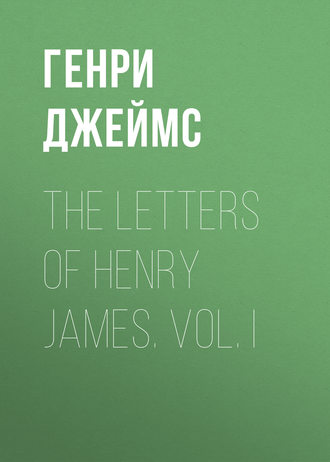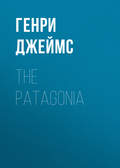
Генри Джеймс
The Letters of Henry James. Vol. I
To Robert Louis Stevenson
H. J.'s article on "The Art of Fiction" was reprinted in Partial Portraits. Stevenson's "rejoinder" was the essay called "A Humble Remonstrance," included in Memories and Portraits.
3 Bolton St., W.Dec. 5th [1884].
My dear Robert Louis Stevenson,
I read only last night your paper in the December Longman's in genial rejoinder to my article in the same periodical on Besant's lecture, and the result of that charming half-hour is a friendly desire to send you three words. Not words of discussion, dissent, retort or remonstrance, but of hearty sympathy, charged with the assurance of my enjoyment of everything you write. It's a luxury, in this immoral age, to encounter some one who does write—who is really acquainted with that lovely art. It wouldn't be fair to contend with you here; besides, we agree, I think, much more than we disagree, and though there are points as to which a more irrepressible spirit than mine would like to try a fall, that is not what I want to say—but on the contrary, to thank you for so much that is suggestive and felicitous in your remarks—justly felt and brilliantly said. They are full of these things, and the current of your admirable style floats pearls and diamonds. Excellent are your closing words, and no one can assent more than I to your proposition that all art is a simplification. It is a pleasure to see that truth so neatly uttered. My pages, in Longman, were simply a plea for liberty: they were only half of what I had to say, and some day I shall try and express the remainder. Then I shall tickle you a little affectionately as I pass. You will say that my "liberty" is an obese divinity, requiring extra measures; but after one more go I shall hold my tongue. The native gaiety of all that you write is delightful to me, and when I reflect that it proceeds from a man whom life has laid much of the time on his back (as I understand it), I find you a genius indeed. There must be pleasure in it for you too. I ask Colvin about you whenever I see him, and I shall have to send him this to forward to you. I am with innumerable good wishes yours very faithfully,
HENRY JAMES.
To William James
The Literary Remains of the late Henry James, with an introduction by William James, had just been published in America.
3 Bolton Street, W.Jan. 2d, 1885.
Dear William—
I must give some response, however brief, to your letter of Dec. 21st, enclosing the project of your house and a long letter from R. Temple. Three days ago, too, came the two copies of Father's (and your) book, which have [given] me great filial and fraternal joy. All I have had time to read as yet is the introduction—your part of which seems to me admirable, perfect. It must have been very difficult to do, and you couldn't have done it better. And how beautiful and extraordinarily individual (some of them magnificent) all the extracts from Father's writings which you have selected so happily. It comes over me as I read them (more than ever before,) how intensely original and personal his whole system was, and how indispensable it is that those who go in for religion should take some heed of it. I can't enter into it (much) myself—I can't be so theological nor grant his extraordinary premises, nor throw myself into conceptions of heavens and hells, nor be sure that the keynote of nature is humanity, etc. But I can enjoy greatly the spirit, the feeling, and the manner of the whole thing (full as this last is of things that displease me too,) and feel really that poor Father, struggling so alone all his life, and so destitute of every worldly or literary ambition, was yet a great writer. At any rate your task is beautifully and honourably done—may it be as great or even half as great a service as it deserves to be, to his memory! The book came at a bad time for Alice, as she has had an upset which I will tell you of; but though she has been able to have it in her hand but for a moment it evidently gives her great pleasure. She burst into tears when I gave it to her, exclaiming "How beautiful it is that William should have done it! Isn't it, isn't it beautiful? And how good William is, how good, how good!" And we talked of poor Father's fading away into silence and darkness, the waves of the world closing over this system which he tried to offer it, and of how we were touched by this act of yours which will (I am sure) do so much to rescue him from oblivion. I have received no notice from Scribner of the arrival of the other volumes, and shall write to him in a day or two if I don't hear. But I am rather embarrassed as to what to do with so many—wishing only to dispose of them in a manner which will entail some prospect of decent consideration and courtesy. I can give away five or six copies to persons who will probably have some attention and care for them (e.g. Fredk. Harrison, Stopford Brooke, Burne-Jones, Mrs. Orr, etc.) But the newspapers and reviews are so grim and philistine and impenetrable and stupid, that I can scarcely think of any to which it isn't almost an act of untenderness to send it. But I will go into the matter with Scribner.... The project for your house is charming—very big it looks, and of a most pleasant type. Love to all.
Ever yourHENRY.
To Miss Grace Norton
3 Bolton St., W.Jan. 24th [1885].
My dear Grace,
…
It is a feature of life in this place that the longer it lasts the more one's liabilities of every kind accumulate—the more things there are to be done, every hour of the day. I have so many to do that I am thinking of inventing some new day with 40 or 50 hours—or else some newer one still, with only half a dozen, as that would simplify a large proportion of one's diurnal duties out of existence.... I am having a "quieter" winter than I have had for some years (in London) and have seen very few new people and not even many old friends. My quietness (comparative of course) is my solemn choice, and means that I have been dining out much less than at most former times, for the sacred purpose of getting my evenings to myself. I have been sitting at the festive British board for so many years now that I feel as if I had earned the right to give it up save in really seductive cases. You can guess the proportion of these! It is the only way to find any time to read—and my reading was going to the dogs. Therefore I propose to become henceforth an occasional and not a regular diner, with the well-founded hope that my mind, body, spirits, temper and general view of the human understanding and of the conversational powers of the English race, will be the gainers by it. Moreover, there is very little "going on"—the country is gloomy, anxious, and London reflects its gloom. Westminster Hall and the Tower were half blown up two days ago by Irish Dynamiters, there is a catastrophe to the little British force in the Soudan in the air (rather an ominous want of news since Gen. Stewart's victory at Aboukir a week ago,) and a general sense of rocks ahead in the foreign relations of the country—combined with an exceeding want of confidence—indeed a deep disgust—with the present ministry in regard to such relations. I find such a situation as this extremely interesting and it makes me feel how much I am attached to this country and, on the whole, to its sometimes exasperating people. The possible malheurs—reverses, dangers, embarrassments, the "decline," in a word, of old England, go to my heart, and I can imagine no spectacle more touching, more thrilling and even dramatic, than to see this great precarious, artificial empire, on behalf of which, nevertheless, so much of the strongest and finest stuff of the greatest race (for such they are) has been expended, struggling with forces which perhaps, in the long run, will prove too many for it. If she only will struggle, and not collapse and surrender and give up a part which, looking at Europe as it is to-day, still may be great, the drama will be well worth watching from [such] a good, near standpoint as I have here. But I didn't mean to be so beastly political! Another drama interesting me is the question of poor dear J. R. Lowell's possible recall after Cleveland mounts the throne. This, to me, is tragic, pathetic. His position here is in the highest degree honourable, useful, agreeable—in short perfect; and to give it all up to return, from one day to another, to John Holmes and the Brattle Street horsecar (which is very much what it amounts to—save when he goes to see you) seems to me to be the sport of a cruel, a barbaric, fortune.... I haven't asked you about yourself—the complexion of your winter, etc. But there are some things I know sufficiently without asking. So do you—as that I am always praying for you (though I don't pray, in general, and don't understand it, I make this brilliant exception for you!)
Your very faithful friend,HENRY JAMES.
To William James
The first number of The Bostonians appeared this month in the Century Magazine, containing scenes in which the veteran philanthropist "Miss Birdseye" figured.
3 Bolton St., W.Feb. 14th [1885].
Dear William,
I am quite appalled by your note of the 2nd, in which you assault me on the subject of my having painted a "portrait from life" of Miss Peabody! I was in some measure prepared for it by Lowell's (as I found the other day) taking for granted that she had been my model, and an allusion to the same effect in a note from Aunt Kate. Still, I didn't expect the charge to come from you. I hold, that I have done nothing to deserve it.... I should be very sorry—in fact deadly sick, or fatally ill—if I thought Miss Peabody herself supposed I intended to represent her. I absolutely had no shadow of such an intention. I have not seen Miss P. for twenty years, I never had but the most casual observation of her, I didn't know whether she was alive or dead, and she was not in the smallest degree my starting-point or example. Miss Birdseye was evolved entirely from my moral consciousness, like every other person I have ever drawn, and originated in my desire to make a figure who should embody in a sympathetic, pathetic, picturesque, and at the same time grotesque way, the humanitary and ci-devant transcendental tendencies which I thought it highly probable I should be accused of treating in a contemptuous manner in so far as they were otherwise represented in the tale. I wished to make this figure a woman, because so it would be more touching, and an old, weary, battered, and simple-minded woman because that deepened the same effect. I elaborated her in my mind's eye—and after I had got going reminded myself that my creation would perhaps be identified with Miss Peabody—that I freely admit. So I have in mind the sense of being careful, at the same time that I didn't see what I could do but go my way, according to my own fancy, and make my image as living as I saw it. The one definite thing about which I had a scruple was some touch about Miss Birdseye's spectacles—I remembered that Miss Peabody's were always in the wrong place; but I didn't see, really, why I should deprive myself of an effect (as regards this point) which is common to a thousand old people. So I thought no more about Miss P. at all, but simply strove to realize my vision. If I have made my old woman live it is my misfortune, and the thing is doubtless a rendering, a vivid rendering, of my idea. If it is at the same time a rendering of Miss P. I am absolutely irresponsible—and extremely sorry for the accident. If there is any chance of its being represented to her that I have undertaken to reproduce her in a novel I will immediately write to her, in the most respectful manner, to say that I have done nothing of the kind, that an old survivor of the New England Reform period was an indispensable personage in my story, that my paucity of data and not my repletion is the faulty side of the whole picture, that, as I went, I had no sight or thought of her, but only of an imaginary figure which was much nearer to me, and that in short I have the vanity to claim that Miss Birdseye is a creation. You may think I protest too much: but I am alarmed by the sentence in your letter—"It is really a pretty bad business," and haunted by the idea that this may apply to some rumour you have heard of Miss Peabody's feeling atteinte. I can imagine no other reason why you should call the picture of Miss Birdseye a "bad business," or indeed any business at all. I would write to Miss P. on this chance—only I don't like to assume that she feels touched, when it is possible that she may not, and knows nothing about the matter. If you can ascertain whether or no she does and will let me know, I will, should there be need or fitness, immediately write to her. Miss Birdseye is a subordinate figure in the Bostonians, and after appearing in the first and second numbers vanishes till toward the end, where she re-enters, briefly, and pathetically and honourably dies. But though subordinate, she is, I think, the best figure in the book; she is treated with respect throughout, and every virtue of heroism and disinterestedness is attributed to her. She is represented as the embodiment of pure, the purest philanthropy. The story is, I think, the best fiction I have written, and I expected you, if you said anything about it, would intimate that you thought as much—so that I find this charge on the subject of Miss Peabody a very cold douche indeed....
Ever yours,H. JAMES.
To James Russell Lowell
Lowell was now leaving London after having held the post of American Minister there since 1880
St. Alban's Cliff,Bournemouth.May 29th [1885].
My dear Lowell,
My hope of coming up to town again has been defeated, and it comes over me that your departure is terribly near. Therefore I write you a line of hearty and affectionate farewell—mitigated by the sense that after all it is only for a few months that we are to lose you. I trust, serenely, to your own conviction of this fact, but for extra safety just remark that if you don't return to London next winter I shall hurl myself across the ocean at you like a lasso. As I look back upon the years of your mission my heart swells and almost breaks again (as it did when I heard you were superseded) at the thought that anything so perfect should be gratuitously destroyed. But there is a part of your function which can go on again, indefinitely, whenever you take it up—and that, I repeat, I hope you will do soon rather than late. I think with the tenderest pleasure of the many fire-side talks I have had with you, from the first—and with a pleasure dimmed with sadness of so many of our more recent ones. You are tied to London now by innumerable cords and fibres, and I should be glad to think that you ever felt me, ever so lightly, pulling at one of them. It is a great disappointment to me not to see you again, but I am kept here fast and shall not be in town till the end of June. I give you my blessing and every good wish for a happy voyage. I wish I could receive you over there—and assist at your arrival and impressions—little as I want you to go back. Don't forget that you have produced a relation between England and the U.S. which is really a gain to civilization and that you must come back to look after your work. You can't look after it there: that is the function of an Englishman—and if you do it there they will call you one. The only way you can be a good American is to return to our dear old stupid, satisfactory London, and to yours ever affectionately and faithfully,
HENRY JAMES.
To William James
To prevent confusion of names it should be mentioned that the "Alice" referred to at the end of this letter is H. J.'s sister-in-law, Mrs. William James. His sister, Miss Alice James, remained in England till her death six years later.
13 De Vere Mansions, W.March 9th [1886].
My dear William,
Long before getting your most excellent letter of Feb. 21st I had been pricked with shame and remorse at my long silence; you may imagine then how this pang sharpened when, three or four days ago, that letter arrived. There were all sorts of reasons for my silence which I won't take up time now with narrating—further than to say that they were not reasons of misfortune or discomfort—but only of other-engagement-and-occupation pressure—connected with arrears of writing, consumption of time in furnishing and preparing my new habitation, and the constant old story of London interruptions and distractions. Thank God I am out of them far more now than I have ever been before—in my chaste and secluded Kensington quatrième. I moved in here definitely only three days ago, and am still rather upside down. The place is excellent in every respect, improves on acquaintance every hour and is, in particular, flooded with light like a photographer's studio. I commune with the unobstructed sky and have an immense bird's-eye view of housetops and streets. My rooms are very pretty as well as very convenient, and will be more so when little by little I have got more things. When I have time I will make you a diagram, and later, when the drawing-room (or library: meantime I have a smaller sitting-room in order) is furnished (I have nothing for it yet), I shall have the place photographed. I shall do far better work here than I have ever done before.
Alice is going on the same very good way, and receiving visits almost daily. A great many people come to see her; she is highly appreciated, and might easily, if she were to stay here, getting sufficiently better to exert herself more &c., become a great success and queen of society. Her vigour of mind, decision of character &c., wax daily, and her conversation is brilliant and sémillant. She could easily, if she were to stay, beat the British female all round. She is also looking very well.... The weather continues bitterly cold, and there will be no question of her going out for a long time to come.
The two great public matters here have been the riot, and the everlasting and most odious – scandal. (I mean, of course, putting the all-overshadowing Irish question aside.) I was at Bournemouth (seeing R. L. Stevenson) the day of the émeute, and lost the spectacle, to my infinite chagrin. I should have seen it well from my balcony, as I should have been at home when it passed, and it smashed the windows in the houses (three doors from mine) on the corner of Bolton St. and Piccadilly. Alice was all unconscious of it till the morrow, and was not at all agitated. The wreck and ruin in Piccadilly and some other places (I mean of windows) was, on my return from Bournemouth, sufficiently startling, as was also the manner in which the carriages of a number of ladies were stopped, and the occupants hustled, rifled, slapped or kissed, as the case might be, and turned out. The real unemployed, I believe, had very little share in all this: it was the work of the great army of roughs and thieves, who seized, owing to the very favourable nature of their opportunity, a day of licence. It is difficult to know whether the real want of work is now, or not, so very much greater than usual—in face of positive affirmations and negations; there is, at any rate, immense destitution. Every one here is growing poorer—from causes which, I fear, will continue. All the same, what took place the other day is, I feel pretty sure, the worst that for a long time to come, the British populace is likely to attempt.... I can't talk about the Irish matter—partly because one is sick of it—partly because I know too little about it, and one is still more sick of all the vain words on the subject, without knowledge or thought, that fill the air here. I don't believe much in the Irish, and I believe still less [in] (consider with less complacency) the disruption of the British Empire, but I don't see how the management of their own affairs can be kept away from them—or why it should. I can't but think that, as they are a poor lot, with great intrinsic sources of weakness, their power to injure and annoy England (if they were to get their own parliament) would be considerably less than is assumed.
The "Bostonians" must be out, in America, by this time; I told them, of course, to send you a copy. It appears to be having a goodish success there. All your tidings about your own life, Bob, &c., were of the deepest interest.... I wish I could assist at your researches and see the children, and commune with Alice—to whom I send much brotherly love.
Ever yourHENRY.






